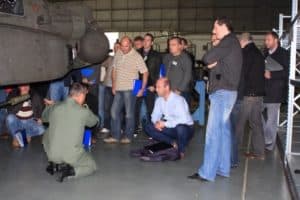How do executives fit it all in? Phil Jones of Brother UK speaks about effective time management

Brother UK at Wattisham
One of the most often questions I’m asked is – ‘How do you fit it all in?’
Running a large company, riding a bike for 5-6 hours a week, attending dinners and functions, writing blogs, being a family head, public speaking, being President of a large community foundation. Yes, I have a lot of interests, yet still live a balanced life working towards the things that matter to me .
The secret to all of this is two key things: –
Living life on Purpose (Not by Accident) informed by a personal life vision, mission and principles.
Optimising the available time I have to drive the things that appear in (1).
Meeting a lot of people on my travels (and coaching/mentoring a fair few), five common characteristics often turn up of poor time prioritisation…..
Those that determine a busy diary as a successful diary, relying on sheer volume of random things in the hope that something big will stick. It often doesn’t and they are often very stressed and have little time for anything or value.
Those that say ‘Yes’ to everything. Serial pleasers, worried of the consequences of saying ‘no’.
Those driven by ‘ego’ – wanting to be at every event in case they miss something or to be simply seen. This is a fast track to failure.
Those that live a life of ‘reaction’ not ‘creation’. They have their priorities the wrong way round with demands being constantly made (and given in to) of their time. Out of control behaviour is common, over-committing and under delivering.
Those lacking any ‘higher purpose’ or ‘clear mission’ for what they are here to do, therefore delivering the characteristics of a squash ball being slammed around a court by others.
Don’t get me wrong, I’m coming from a position of committing one or all of these time consuming characteristics at some point. My epiphany was defining (5) and then organising my entire life around that and adopting the mindset of ‘a chess player, not a chess piece’.
I’m always curious as to how other people ‘hack’ their time to maximise what they do, so here’s 15 things that you could consider doing to replicate the things I do to optimise time for the right things. In no particular order (and I’m writing these on a plane journey to take advantage of a window).
Scan business cards straight into Evernote using the camera business card scanner function. It can be set to automatically connect to a contact on Linkedin. So, after an event, I’ll spend 5 minutes scanning the cards and all the Linkedin stuff happens automatically = time saved. The cards are saved into a specific notebook in Evernote which means I have a digital ‘rolodex’ of business cards synced across all my devices.
Create rules on your e-mail. My e-mail inbox is very very busy, yet I only see 30-40 a day. Everything else has rules on it which automatically routes it into folders for me to batch process (my next point). Examples are things like regular reports, daily e-mail updates from news sources and Linkedin invitation e-mails to name a few amongst a long list. The things that hit my inbox are generally where my name appears in the ‘to’ field. Batch process whenever you can. Some bits of work have similar characteristics and and may not be urgent. Get all those bits into a folder (on or off-line) and work through them in one big push. Set a timer for say 30 or 45 minutes and get your head down and power through it all. Get slick at this.
Turn push e-mail off your mobile device. Seriously! Switch it to pull on demand. This eliminates constant buzzing and breaking of attention. When you’re ready to process your e-mail, do it. But not until then. Log out of your e-mail when doing important bits of thinking or planning. Ditch your device!
Web conferencing. A plug for one of the services my company provides – yes! Why? It will make you more efficient. Using down time for quick catch ups with people is a very good use of time and also make you faster. Rather than bottling up meetings for when you are ‘back in the office’ – equip yourself to meet anywhere. You’ll often see me in a hotel reception or coffee shop with a set of earbuds in, catching up. It also is more efficient in my experience, with shorter more focused discussions.
Evernote shared folders. Evernote is an awesome app when used effectively. I use shared folders with my assistant and senior leadership team to make notes which automatically sync to shared folders on their devices in real time. As I take the notes, they see the notes which saves a shedload of time on further e-mails.
Don’t treat every request with equal priority. Figure out what can wait, what is not important, what needs immediate action (when I say immediate I mean you’re next available time window). See this a lot in others, they see every buzz, conversation or event as equal therefore leading to huge amounts of wasted time.
Take some time at the beginning of each day to determine what your main effort should be. I do this at a coffee shop on my way to work – a 30 minute press of the pause button to look at the day ahead and the next seven days; What is the big stuff that needs to have my attention? Do I need to diarise time to power through specific things? When you determine your ‘main effort’ for that day, stick to it and push on to achieve it.
Do you have your personal vision and mission determined? When you do, you figure out what you need to say ‘no’ to. Business is not about saying ‘yes’ to everything, it’s about saying yes to the opportunities that get you closer to your goals. A rocking chair moves but never goes anywhere? Is that you?
Manage your social media via a client which gives you capability to advance filter. My Twitter and Linkedin are managed in Hootsuite. When I follow someone I automatically add them to a prescribed list I have created which is themed by topic. By doing this, your stream is specifically curated against key topics allowing you to quickly scan by subject. It’s a waste of time scanning through your feed for the nuggets of gold, let the tech do the work. I post to Linkedin via this client too (different content).
Use Prezi as your presentation client. Rarely do I use PowerPoint nowadays, everything is in the cloud. This gives the potential for others to work on things for me if unavailable or for me to use bits of time available (back of taxis, airport lounges, waiting gaps between meetings). It also saves lots of time by having to merge different decks if a few people are presenting on the same day, you can all use the same collaboration space.
Set clear time expectations. Whether working through tasks or having a meeting set your intent out. Beginning a meeting I prefer to state my end time in advance so that the discussion stays focused. ‘I have one hour’ sharpens the conversational saw.
Ask people to highlight in their e-mail subject line to you whether something is urgent. This is a particularly important with colleagues or you end up drowning under the deluge. Everyone suffers from ‘infobesity’ so they will appreciate if you reciprocate by putting things like ‘not urgent’ or ‘response needed by Friday’ in your e-mails.
Get a second monitor on your PC. Most people in my workplace are given the second monitor option, it makes multitasking much easier, particularly if needing to refer to several documents at the same time. I actually have x3 screens – 1 x laptop, supported by two 24″ monitors either side, like a flight controllers station. When working on complex projects it’s essential and a brilliant hack if budget and space affords.
Value your time. Literally put a value on it by hour. What are you worth? It makes you ‘pay’ attention. Family time is priceless, watching your kids grow up, being at a sports day or parents evening – this should be a basic principle for you so give this up like you would a chest of gold – without a fight! When you value your time there is a trade-off for every ‘lets catch up for a coffee’ request. Is it going to be worth £XXX of your time?
Guard your diary like you would guard your home. Your diary is your statement of intent. The things in it should be a clear indication of what you’re working towards. If it’s full of rubbish (things that do not get you closer to your goals you need to ask yourself some tough questions).
Questions Like….
Do we need to meet in person or is a quick call/web conference easier?
Does this get me closer to my goals?
Who needs this meeting, them or me?
Is it urgent or important? Can it wait? What’s the price for going and not going?
What’s the travelling requirement for this meeting? Can I afford that or should we web conference?
It’s terribly important you also leave time to think, relax and refresh to be at your best. To allow your brain to function and drift, to invest in the right friendships and your family, to have some ‘me’ time and reset to your best.
No-one will ever celebrate you for being the ‘busiest person they’ve ever known’ when it comes time to meet your maker. They will remember you for the ‘impact’ you made, hack your time to make that happen.
Be the person who appreciated you have the shortest time here, that time must never be taken for granted and your time was a currency you wanted to invest to lift others higher.
– Phil Jones, MD Brother UK








